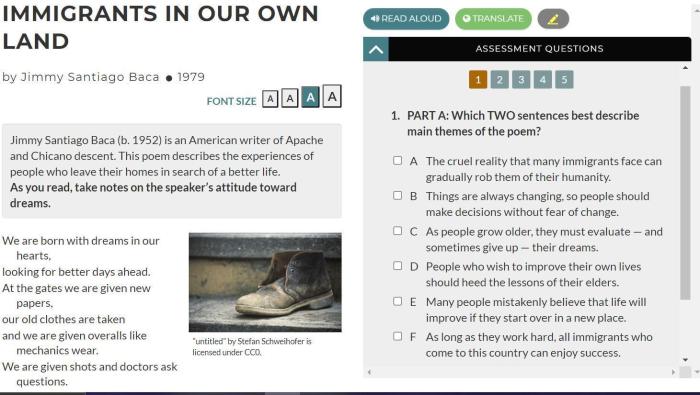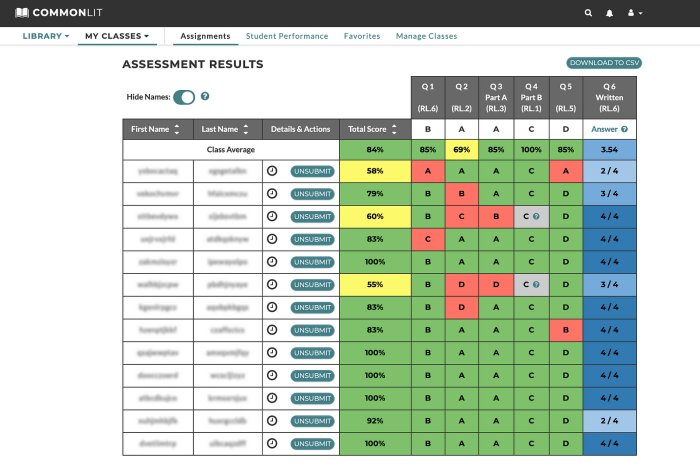Immigrants in our own land commonlit answer key – Beginning with the title “Immigrants in Our Own Land: A Comprehensive Guide to the History, Impact, and Future of Immigration in the United States,” this work delves into the multifaceted topic of immigration, providing a comprehensive analysis of its historical, current, and potential implications for the United States.
Through a detailed examination of historical waves of immigration, current trends, and the multifaceted impact of immigration on the economy, society, and politics of the United States, this guide offers a nuanced understanding of the complexities surrounding this issue.
Historical Context
Immigration has played a defining role in shaping the United States throughout its history. The country has welcomed waves of immigrants from diverse backgrounds, seeking refuge, opportunity, and a better life.
The first major wave of immigration occurred in the 19th century, primarily from Europe. Millions of people fled poverty, religious persecution, and political unrest in their home countries. They settled in cities along the East Coast and Midwest, contributing to the rapid growth and industrialization of the United States.
Subsequent waves of immigration followed, including from Asia, Latin America, and the Middle East. Each wave brought new cultures, languages, and traditions, enriching the fabric of American society.
Current Immigration Trends

Current immigration trends in the United States reflect a diverse range of countries of origin. Mexico remains the top country of origin, followed by India, China, the Philippines, and El Salvador.
Immigration rates have fluctuated over time, influenced by factors such as economic conditions, political instability, and changes in immigration policies. In recent years, there has been a slight decline in overall immigration rates, but the number of unauthorized immigrants has increased.
Economic Impact of Immigration: Immigrants In Our Own Land Commonlit Answer Key

The economic impact of immigration on the United States is complex and multifaceted. Immigrants contribute to the workforce, filling labor shortages in various industries, and stimulating economic growth.
Studies have shown that immigration has a positive impact on job creation, particularly in sectors such as construction, healthcare, and technology. Immigrants also start businesses at a higher rate than native-born Americans, creating new jobs and contributing to economic development.
Social Impact of Immigration

Immigration has had a profound social impact on the United States, contributing to its cultural diversity, vibrancy, and innovation.
Immigrants have brought their own languages, traditions, and customs, enriching the American cultural landscape. They have also played a vital role in shaping the country’s education, healthcare, and arts sectors.
Immigration has also fostered a greater understanding and appreciation of different cultures, promoting tolerance and inclusivity within American society.
Political Impact of Immigration

Immigration has played a significant role in shaping the political discourse and electoral outcomes in the United States.
Immigration policies and debates have been a central focus of political campaigns, with different parties proposing varying approaches to border security, legalization, and pathways to citizenship.
Immigration has also influenced the demographics of the electorate, with immigrant communities becoming increasingly influential in local and national elections.
Expert Answers
What are the main reasons for immigration to the United States?
Throughout history, people have immigrated to the United States for various reasons, including economic opportunities, political asylum, religious freedom, and family reunification.
What are the positive economic impacts of immigration?
Immigration can contribute to economic growth by increasing the labor force, stimulating innovation, and creating new businesses.
What are the ethical considerations related to immigration?
Ethical considerations in immigration policy include the protection of human rights, the fair treatment of immigrants, and the responsibility of governments to address the needs of both immigrants and citizens.